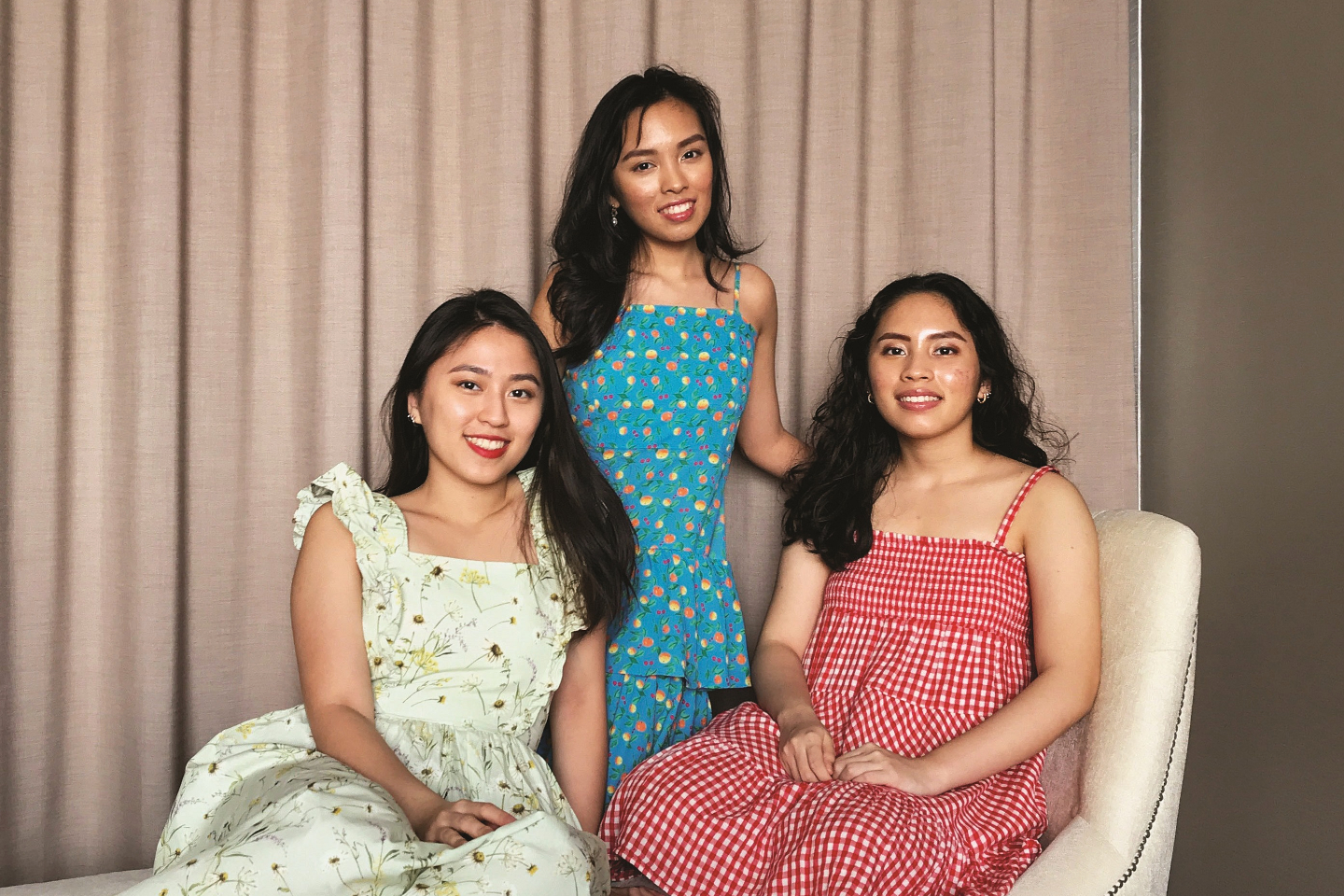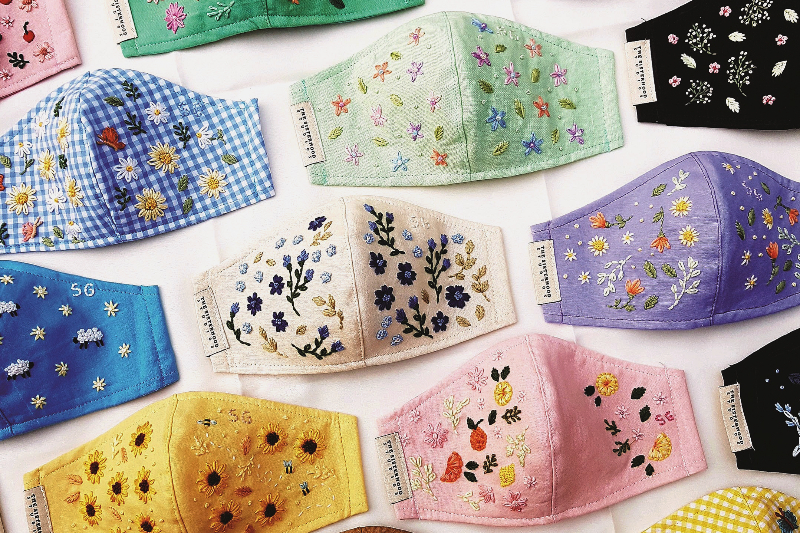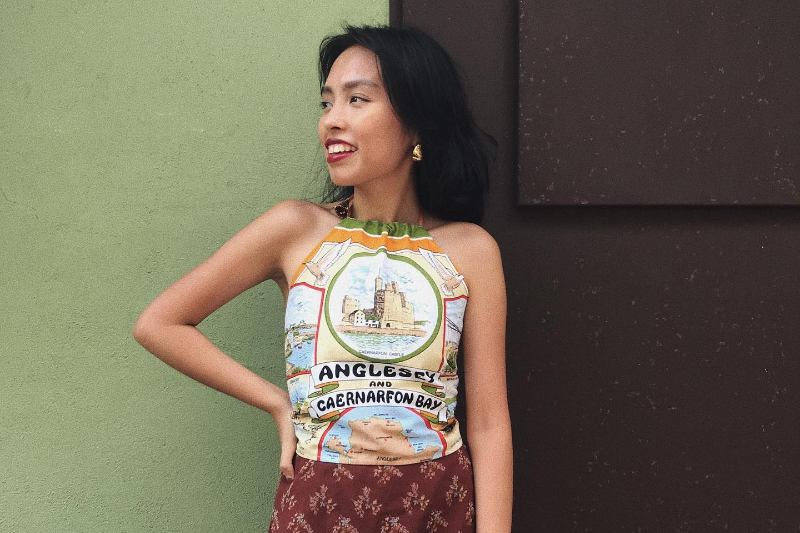
From left: Sandra, Sarah and Samantha hope their creations will be worn over and over by customers (All photos: The Sisterhood Studios)
The darkness of the Covid-19 pandemic has had silver linings for some, such as the birth of The Sisterhood Studios for the Gomes sisters. Sarah Jane, Sandra Jane and Samantha Jane Gomes had always dreamt of starting their own business together, and in 2020 that dream was realised.
For Sarah, freshly out of fashion school, a career in the industry was something she had always wanted. “She is good at creating things and working with her hands,” says Sandra, who adds that she just went along with the idea of setting up The Sisterhood Studios, and soon found herself thriving in the business. Samantha is currently finishing secondary school so she helps out with the odds and ends whenever she can.
The Sisterhood Studios — a name that demonstrates their strong bond — came about during a casual conversation they had during a sleepover. Sandra says, “Occasionally, we would have a ‘sisterhood night’ just to spend time together, and during one such session we were reminiscing about our childhood. That sparked the idea to incorporate ‘sisterhood’ into our brand name.”
Mostly self-taught, the sisters learnt basic embroidery from their mother at a young age. Years later, Sarah found an interest in needlework after having to do in-depth research on traditional handicrafts in fashion school. “It took years of practice, patience and experimenting, but despite the long journey, we wouldn’t consider ourselves pros at it; we still have plenty to learn,” explains Sandra.
embroidered_masks.jpg

When the world was in dire need of face masks, the sisters wanted to reduce the dependence on disposable ones. Hence, they decided to produce embroidered masks. Sandra says, “We never thought our business would begin with face masks but, to our surprise, it grew from there and we have expanded into other handmade products.” Their original plan was to sell only to friends and family, but demand encouraged them to start selling to the public.
A lot of thought, effort and time are spent on every design, so they try to make as many as they can each time — 50 to 100 pieces per batch — to give customers a variety of colours, sizes and strap options to choose from. “The embroidery alone can take up to two hours, not counting the sewing time and finishing touches, such as adding the elastic and wire features,” Sandra says.
The long production time for each mask is justified as it is embroidered entirely by hand because many of the stitch techniques cannot be replicated using a machine. “Stitching with our hands allows us to add the finer details, [something machines oftentimes cannot do]. You will notice that each face mask is unique in design,” says Sandra. Their masks also feature batik linings which match the exterior designs for that extra local touch.
Sarah, who is in charge of product development and design, gets inspiration from everything that she does, sees, hears, touches and eats. From gardening and knitting to the local kuih and patchwork blankets their grandmother used to make, everything is potentially a source of ideas.
sisterhood_studios.jpg

The sisters’ first collection of embroidered masks was inspired by their own experience with nature, after spending a lot of time reconnecting with it in their garden. “It was a time of rest and rejuvenation, and it was lovely just witnessing caterpillars transform into butterflies, looking at birds’ nests and observing the other small animals that came by our place. I think the first few batches of masks were really inspired by the garden and the stories it holds that continue to unfold each day,” says Sarah.
Starting a business during the pandemic has its limitations, such as slow operations and production. But it is tougher for the family, especially with two of them still studying. “Financial difficulty was one of the problems. We wanted to be independent. So, we chipped in our savings to buy materials, apart from using stuff we already had lying around, and experimented with them. We definitely have been in situations where we had to improvise, make the best out of it, and work with what we have,” Sandra says.
The sisters seek to work in a healthy environment for their mind and body, which in turn helps them produce excellent results. When they are faced with overwhelming challenges, it is a call to rest. “Sometimes, when we feel physically or mentally drained, we take a break and then come back to assess the situation with a refreshed mind and clearer perspective,” adds Sandra.
They started with a small capital to make their first batch of embroidered masks. Positive response from customers allowed their business to grow. “From then, we used the revenue to invest back into our business and expanded into making other products, which was what we wanted to do all along.”
Apart from masks, the studio also sells halterneck tops. The reversible Bianca Halter is an ode to flower power and the disco era of the late 1960s and early 1970s as well as fashion icon, Bianca Jagger. These tops can be adjusted to accommodate more body types.
The sisters want customers to wear their creations over and over and hope to expand the business and offer jobs to the community. “We believe that at the right time and place, growth will happen,” Sandra says.
This article first appeared on Dec 13, 2021 in The Edge Malaysia.


